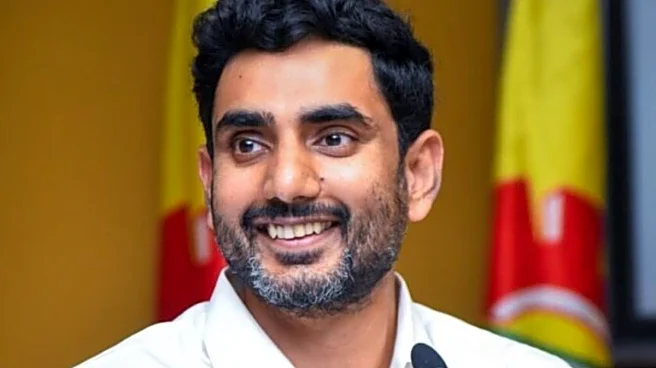My only concern is creating “jobs, jobs, and more jobs”, because everyone has well-educated children and they’re all asking the single question – “where are the jobs?”, Nara Lokesh, Minister for Information
Technology, Electronics and Communications, in the Andhra Pradesh government, told Moneycontrol in an exclusive interview.
“The writing on the wall is very clear,” the Minister said, adding that the Andhra government is aiming to create 2 million jobs in the next five years across sectors, including tourism, agriculture, blue-collar manufacturing, etc.
“We had a scheme where we are financially supporting auto drivers. When we launched the scheme…I asked a woman (driving an auto), what does she want from the government…and she said, ‘I’ve two kids, just get them jobs’”, Nara Lokesh said.
The Minister explained the state government is working on implementing all such policies which would create more jobs. For instance, the “99 paise land model” is mainly aimed at catalysing jobs in the state.
“Why are you giving it (the land) at 99 paisa (per acre), for 25,000 IT jobs, right? The kind of economic impact it has on that region is massive. And that is the reason I have a very clear policy for it. And a few of them have actually gone to the court and challenged it, and court didn’t even admit it,” Nara Lokesh said.
The 99 paise model is part of the state’s broader strategy, which includes policies like the ‘Land Incentive for Tech Hub (LIFT) Policy 4.0’, where eligible IT/ITeS companies must meet specific criteria, such as having a market capitalization of at least $1 billion or creating a minimum number of jobs (such as 3,000 jobs in three years).
So far, Tata Consultancy Services (TCS) has been allotted 21.16 acres in Visakhapatnam for 99 paise per acre, with a commitment to invest around Rs 1,370 crore and create an estimated 12,000 jobs. And Cognizant has been allotted 21.31 acres, with a commitment to invest around Rs 1,582.98 crore and create about 8,000 jobs.
“All these are all marquee names in their own sectors. And whatever commitments they’ve made, they’ve always delivered on,” Nara Lokesh said.
He said the LIFT Policy is aimed at attracting the Fortune 500 companies who have a clear track record of creating economic value and creating jobs. “And this (creating jobs) is part of the agreement. It’s part of the agreement on which the land is given to these companies,” the Minister said.
On skilling, the Minister said that it’s not only an Indian problem, but a global problem. “Every country is going through this pain point,” he said.
To address this, the AP government has now created a portal which would not only look at the demand and supply issue, but highlight the skill interventions needed to be done.
“What specific skill upgradation is required? Which sectors need this upgradation? That’s one aspect. The second thing is what I call clusterization. This is very, very important,” said the Minister.
“How can I create the entire ecosystem of manufacturing of a certain sector in a 100 km radius? For instance, in electronics manufacturing, there’s a screen, there’s a camera module, there’s a camera lens, there’s a battery, then there’s a box, the retail box, the manual, the accessories, everything should be within a hundred km…I call these verticals,” explained the Minister.
The horizontal is skilling. “We need to have a workforce that’s ready to look at the assembly of items,” said Lokesh.
“50% of India’s air conditioners come from Andhra, and it’s going to go up to 70% with the new in investments made,” he said.
The Minister also said that he is asking the private sector to tell him what to do, and where the next wave of jobs is going to be created? “Which part of AI, what is the role of quantum computing in this direct ecosystem? And then what can we do as a state in augmenting it?”




/images/ppid_a911dc6a-image-177101752951095973.webp)



/images/ppid_a911dc6a-image-177101403147018469.webp)
/images/ppid_a911dc6a-image-177101053501199609.webp)
/images/ppid_59c68470-image-177101003680064644.webp)



